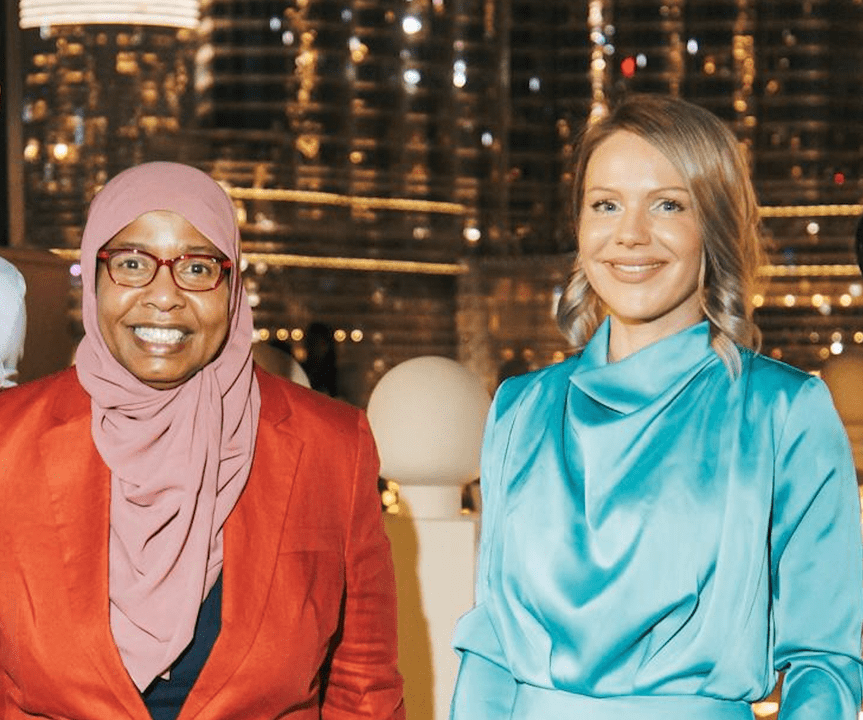Dr. Hanan El-Mileik is a highly experienced and dedicated, and patient-focused, UK-trained consultant gastroenterologist. She is dual-certified by the Royal College of Surgeons for both internal medicine and gastroenterology, having completed her specialist training in the North and East London area. Dr. Hanan is passionate about medical education, coaching, and mentoring and was appointed as a regional advisor for the Royal College of Physicians for Central and North East London. Dr. Hanan served as a consultant for 14 years at the Barking, Havering, and Redbridge University Hospitals NHS Trust, where she also held leadership and teaching roles, prior to relocating to work in Dubai toward the end of 2023.
At Allocation Assist, we always enjoy catching up with our doctors and finding out about their experiences and achievements.
Dr. Hanan, thank you for taking the time to talk to us. Can you tell us a bit about your background and specialist training in London?
I am originally from Sudan, from the capital, Khartoum. Although my parents were living and working in Saudi Arabia, I grew up in Khartoum, staying with my grandparents and extended family. I did well at school, and when it came time to apply for medical school, my father wanted me to go to a university in the UK. However, I wanted to stay in Sudan and go to university with my school friends. I was accepted into the University of Khartoum, which was very prestigious and competitive.
The medical course there was modelled on the Cambridge University course, a legacy from the colonial days after Sudanese independence. My father agreed that I could stay in Khartoum for my undergraduate studies on the condition that I go to England afterwards to do my specialist training. So, I arrived in London in the early 1990s. It was a bit of a culture shock initially. I found England to be a very tolerant country, and pthe eople were welcoming.
My training
I received excellent specialist training, gaining a wide range of skills and experience in some of the best teaching hospitals in London, such as the Royal London and Barts, University College Hospital, the Royal Free, and Queen’s Hospital. My training took about 15 years, as I first completed consultant training in internal medicine and then Gastroenterology, as well as subspecialty training in Luminal Gastroenterology. I gained expertise in diagnostic and interventional endoscopy, laser endoscopy therapy, and treating a wide range of conditions, including inflammatory bowel diseases.
During my training, it was a requirement to complete a large number of procedures, such as 450 each of EUS (Endoscopic Ultrasound) and ERCP (endoscopic retrograde cholangiopancreatography) procedures, in order to master the required skills. Following my completion of training (CCT) in 2009, I was a locum consultant in Basildon before being appointed as a gastroenterology consultant at Queen’s Hospital in Romford, in collaboration with the Royal London and Barts.
traineesI am passionate about education, so I did my Postgraduate Diploma in Medical Education and have been involved in training junior doctors. I was also a Senior Committee member of the North East Thames Region for the London Deanery where we assessed and rseniord Senior Registrars and Trainees for the specialty of Gastroenterology.
What drives your passion for teaching and mentoring others?
There is nothing more satisfying or rewarding to me than passing on the experience and knowledge that I have gained over the years to the next generation. It’s incredible to observe them as they learn, grow, mature, and develop in their respective roles. I was fortunate to have had great mentors when I was progressing in my career, and I am indebted to them for helping me to become who and what I am now. It is this awareness of the importance of guidance and mentoring that inspired me to do the same for others. They say you come to know you are a great teacher when your students become better than you.
You were quickly promoted to leadership roles. Can you tell us how that happened?
I focused on my clinical work, which I enjoyed, and I wasn’t seeking a management or leadership role. However, the hospital management recognized my leadership qualities in me, and they soon promoted me to Clinical Lead for Endoscopy and Inflammatory Bowel Disease. Later, I became Head of Department, a role I held for 7 years. I also served as a regional advisor for the Royal College of Physicians in London, mentoring emerging clinical Leads in various specialties and consultants facing challenges in the region.
While there can be more stressful aspects of being in leadership, I do enjoy mentoring others and creating an atmosphere of collaborative teamwork. I believe that when we all work together each one can reach their full potential for the benefit of the patients we serve.
Why did you decide to relocate to Dubai?
One of my best friends from university has been living and working in Dubai for 20 years. She was encouraging me to come here many years ago but I wasn’t interested at that time. I was happy and fulfilled in my role in the UK. I was also caring for my mum who was in ill health and living with me. Sadly, I lost my mum at the beginning of 2020 and after this,his I did start to think about making a change. It was a difficult period in my life and every time I passed my mom’s bedroom, it reminded me of her. However, the COVID-19 pandemic had started, so I couldn’t move at that time.
Beginning of 2023
At the beginning of 2023, I received an email from a company that I hadn’t heard of saying that I had been recognised for my high profile in my specialty and I would consider relocating to Dubai. When I got a second and then third email, I decided to check if it was genuine. In February 2023, once I established that the email had come from a reliable source, I called the number for Allocation Assist.
Emilie Davies and her team were extremely helpful and reassuring. They told me that a hospital in Dubai was looking for a highly qualified and experienced female Gastroenterology Consultant. After finding out more, I thought that a new challenge and experience would be good for me.
When the war broke out in Sudan on 9th April 2023, our family, like many other Sudanese families, got together to support family members who very suddenly had to leave everything behind in Khartoum, including houses, jobs, and studies. I realised that, earning a tax-free salary in the UAE, I would be able to provide more support to my extended family who had to leave Sudan and start again in a new place. Living and working in Dubai also provides a great quality of life and easy travel routes to and from other parts of the world.
How have you found the experience of relocating to work in the UAE?
There is always a period of adjustment when relocating to a new country. Emilie and her Allocation Assist team have been very helpful, providing the support and advice I needed to make the transition easier. I am also grateful for the support of colleagues who I have met here, both at work and through the Allocation Assist network. It has made me feel like I already had a family here when I arrived.
Have you come across any challenges, and how have you overcome them?
For me, coming from working in the National Health Service, getting used to working with insurance companies and applying for pre-approvals was challenging. When I first arrived, I wasn’t familiar with the DRG (diagnosis-related group) classification system for medical insurance. While this can involve some extra work to show justification for the required diagnostic tests and treatment, I have not let this change my clinical judgment or practice.
I always do what is in the best interests of my patients, believe in quality over quantity, and will not do unnecessary tests or procedures, but I am persistent in advocating for my patients to make sure that they get the best treatment for them. I have found that when you are honest and build trust with patients, they will come back and also recommend you to others.
How are you utilising your expertise in teaching and management here in Dubai?
Currently, I am working in two NMC specialty hospitals in Dubai: Al Nahda and Dubai Investments Park (DIP). My clinical work is rewarding, and I have also quickly become involved in teaching and leadership roles. I am on the committee for developing clinical guidelines for the hospital. I am continuing my passion for teaching and mentorship, training postgraduates, and devising continuing medical education (CME) initiatives for staff. As a team, we share and discuss interesting and challenging cases in order to learn and continually improve our clinical practice.
Does the patient mix or variety of conditions you see here differ?
Yes, the UAE population differs from the UK due to the high expatriate population from many different countries who come to work here. My patients are generally younger, with not many past retirement age compared to the UK. Therefore, I don’t see as many GI cancers that are more common in older people. I do see more conditions related to lifestyle factors such as stress and the demands of a competitive work environment, including shift work and poor dietary habits.
There are a wide range of conditions which can cause symptoms or signs affecting the gastrointestinal system, which is why Gastroenterology specialists also need training and experience in Internal Medicine. I see patients from all nationalities and backgrounds, both male and female. Particularly here in the Middle East, women may request to see a female Gastroenterology Consultant.
This is not only the case for Arabic or muslim women, I also have a lot of patients who are European women. Elsewhere in the world, including in the UK, a lower proportion of female doctors choose to specialise in Gastroenterology and this is probably due to the long training which can make it more difficult for those who want to start a family.
What are your plans for the future?
There are plans for expansion and new services underway at NMC. A new bowel cancer screening service will be rolled out from next month. We are also in the process of setting up a comprehensive centre for digestive diseases including endoscopy, colonoscopy, upper and lower GI cancer surgery, laser endoscopy therapy, treatment for eating disorders, bariatric surgery and other gastrointestinal surgeries. This new centre, set to be one of the best in the UAE, will be based in a new building equipped with great facilities at NMC Royal Hospital in Dubai Investments Park.
The hospital strategically locates near growing residential areas in Dubai and also near the Al Maktoum International Airport, planned for expansion to become one of the largest airports globally, eventually accommodating 260 million passengers per year. NMC’s Digestive Disease Centre will serve as a hub for patients both from the UAE and those travelling from countries in the Middle East, North Africa and Indian subcontinent. I am enjoying my life in Dubai and I am looking forward to the future.
Check Out More Interviews:



